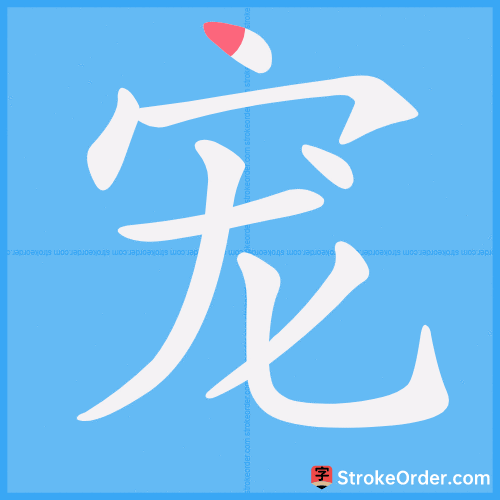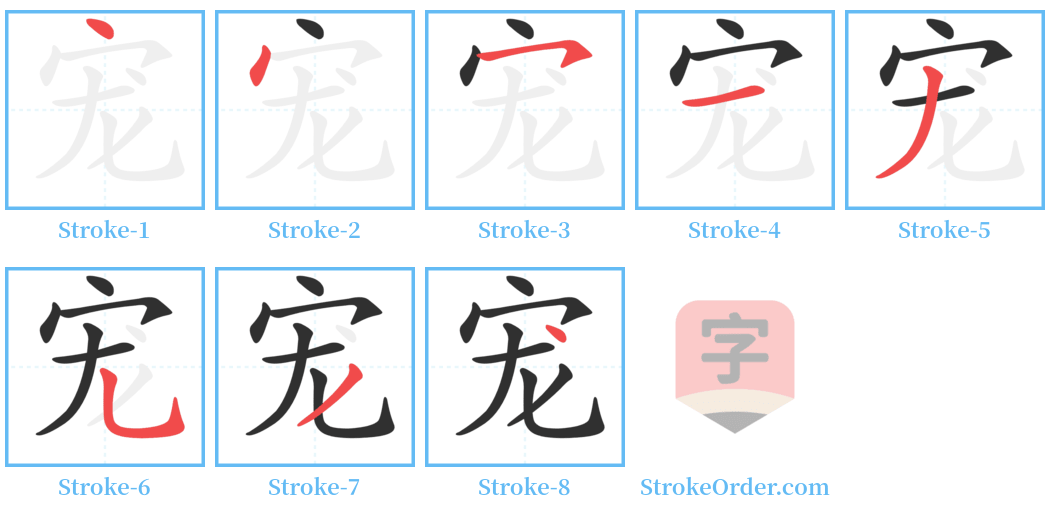宠 Stroke Order
Animated Stroke Order of 宠

Stroke Order Diagrams for 宠

Step-by-Step Handwriting Guide for 宠

Learn to Write Chinese Characters with Video Tutorials
Watch the video of writing the Chinese character "宠", learn the correct stroke order (笔顺) of the character "宠", and master the standard way of writing the character "宠".
Free Printable Handwriting Practice with Stroke Order: 宠
Printable Writing Practice Worksheet of "宠" in Portrait Orientation (Tian Zi Ge)

Printable Writing Practice Worksheet of "宠" in Landscape Orientation (Tian Zi Ge)

Information of 宠
Pinyin
chǒng
Radical
宀
Strokes
8 strokes
Usage
★★★★★
Definition
to love / to pamper / to spoil / to favor
宠 (chǒng)
1. 爱: To love.
Example: 宠爱 (dote on), 宠儿 (beloved child), 宠信 (bestowed with trust), 宠幸 (fortunate to be favored), 得宠 (to gain favor), 失宠 (to lose favor), 争宠 (compete for favor).
2. 纵容,偏爱: To indulge, to favor.
Example: 别把孩子宠坏了 (Don't spoil the child).
3. 妾: Concubine.
Example: 纳宠 (to take a concubine).
4. 推崇: To revere.
Example: 尊宠 (to hold in high regard).
动词 (Verb):
1. 同本义 (same as the original meaning) [En. revere].
引:
- 《国语·楚语》: 宠神其祖. Annotation: “尊也.”
- 《说文》: 宠, 尊居也.
- 《左传·襄公三十年》: 宠名皆弃. Refers to family.
例:
又如: 宠存 (to revere and comfort), 宠重 (to hold in high regard), 崇厉 (to encourage and revere).
2. 宠爱 [En. bestow favor on; dote on].
引:
- 《左传·昭公十年》: 君以为忠,而甚宠之.
- 《论衡·幸偶》: 不宜爱而受宠.
- 《左传·昭公三年》: 少姜有宠而死.
- 《老子》: 宠辱若惊.
- 《史记·屈原贾生列传》: 上官大夫与之同列,争宠而心害其能.
例:
又如: 一家人很宠他 (The whole family dotes on him), 宠冠一时 (to be loved to an exceptional degree), 宠拔 (to love and promote).
名词 (Noun):
1. 荣耀 [En. honor].
引:
- 《易·师》: 承天宠也. Zheng annotation: “光耀也.”
- 《国语·楚语》: 其宠大矣. Annotation: “荣也.”
- 《史记·赵世家》: 宠有孝悌长幼顺明之节. Zheng meaning: “贵也.”
- 宋· 范仲淹《岳阳楼记》: 心旷神怡,宠辱偕忘.
例:
又如: 宠辱 (glory and disgrace), 宠借 (to grant honor and rewards).
2. 恩惠 [En. kindness].
例:
如: 宠灵 (grace and favor), 宠光 (favor that shines), 宠利 (favor and benefits).
3. 受宠爱的人 [En. pet].
引:
- 《左传·僖公十七年》: 齐侯好内,多内宠.
例:
又如: 内宠 (beloved within the household), 爱宠 (beloved pet).
4. 皇帝所施的 [En. imperial].
例:
如: 宠劳 (imperial consolation), 宠赐 (imperial favor), 宠惠 (imperial grace).
Input Method for 宠
Pinyin
chong3
Wubi
pdxb|pdxy
Cangjie
jikp
Zhengma
wdgm
Four Corner
30414
Unicode
U+5ba0
Same Pronunciation Characters